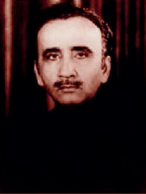
Muhammad Khan Junejo’s Grovement
The period from 1985 to 1988 was marked by significant political developments in Pakistan, as Muhammad Khan Junejo assumed the role of Prime Minister in the midst of a complex political landscape. Junejo’s tenure witnessed various challenges and opportunities, providing an important chapter in Pakistan’s political history.
Junejo’s Ascendancy
Muhammad Khan Junejo, a modest and unassuming politician, emerged as a prominent figure within the Pakistan Muslim League (PML) during the early 1980s. He was chosen by General Muhammad Zia-ul-Haq, the then-President and Chief Martial Law Administrator, to lead the civilian government as Prime Minister following the non-party elections held in 1985. This marked a transition towards a limited form of civilian rule after years of military governance.
Challenges and Political Landscape
Junejo’s government faced a complex political environment characterized by a fragile civil-military balance. While Zia-ul-Haq retained significant powers as the President and Chief Martial Law Administrator, Junejo’s role was vital in managing the civilian administration and addressing the challenges Pakistan faced.
One of the notable challenges was the need to restore and strengthen democratic institutions in the country. Junejo’s government aimed to gradually devolve power to elected representatives, paving the way for a return to full-fledged democracy. This endeavor was welcomed by many, as it represented a step towards political normalization.
Another major issue during Junejo’s tenure was the Afghan conflict. Pakistan was deeply involved in supporting Afghan resistance fighters (Mujahideen) against the Soviet Union’s occupation of Afghanistan. Junejo’s government managed Pakistan’s role in the conflict, balancing the need to secure U.S. aid and support for the Afghan resistance while ensuring stability within Pakistan.
Achievements and Reforms
Despite the complex political context, Junejo’s government managed to make some notable achievements. These included efforts to streamline and improve the administrative structure, addressing governance issues, and initiating economic reforms aimed at promoting growth and development.
Junejo’s government also pursued policies that aimed to foster greater political participation and strengthen democratic institutions at the grassroots level. This included local government elections and the empowerment of local bodies to address issues at the community level.
End of the Junejo Era
The Junejo era came to an abrupt end in May 1988 when a political crisis erupted between Junejo and President Zia-ul-Haq over issues related to the Eighth Amendment to the Constitution. Junejo sought to limit the President’s powers, which led to his dismissal by Zia. This marked the end of Junejo’s tenure as Prime Minister and underscored the continued influence of the military in Pakistani politics.
Conclusion
Muhammad Khan Junejo’s government from 1985 to 1988 represented a period of political transition in Pakistan. His tenure aimed to restore and strengthen democratic institutions while managing the challenges posed by a powerful military establishment and external factors like the Afghan conflict. Though his time as Prime Minister was relatively short, Junejo’s commitment to democratic principles and governance reforms contributed to Pakistan’s ongoing journey toward political stability and civilian rule.

